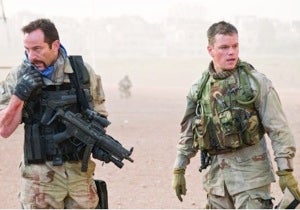A few years from now, when some enterprising film studies student scribbles away at a doctoral dissertation on Iraq War movies, “The Hurt Locker” is likely to be the only bright spot in a sorry roster.
Most movies about America’s involvement in this now eight-year long war are as murky, confused and misguided as the war itself. And now you can add “Green Zone” to the list of misfires.
 What’s intriguing, though is how few of the movies are actually about the war itself. Ditto for its mirror conflict, the Afghan War. Most have been contemporary variations on director William Wyler’s 1946 classic, “The Best Years of Our Lives” (1946), which depicted the after-effects of WWII on the men who had served as they tried to readjust to civilian life.
What’s intriguing, though is how few of the movies are actually about the war itself. Ditto for its mirror conflict, the Afghan War. Most have been contemporary variations on director William Wyler’s 1946 classic, “The Best Years of Our Lives” (1946), which depicted the after-effects of WWII on the men who had served as they tried to readjust to civilian life.
Though labeled Iraq and Afghan war movies, such recent dramas as “In the Valley of Elah,” “Home of the Brave,” “Grace is Gone,” “The Lucky Ones,” “The Messenger,” “Stop-Loss” and “Brothers” have all focused on characters now residing on U.S. soil whose lives — or the lives of those they loved — have been disrupted or ended.
All have performed dismally at the box office. It seems that moviegoers can smell a downer a mile away and want none of it. The lesson to be learned: If the war is still going on in our living rooms nightly on the news, no one wants to see it in theaters.
The same was true for movies about Viet Nam, another unpopular and polarizing conflict. Discounting John Wayne’s bombastically hawkish “The Green Berets” in 1968, it wasn’t until well after American involvement ended in 1975 that Hollywood was able to attract sizable audiences to such films as 1978’s “Coming Home,” 1979’s “Apocalypse Now” and 1986’s Oscar-winning “Platoon.”
Excellent films about Iraq and Afghanistan have been made — except they’re all documentaries. I’m thinking of “Taxi to the Dark Side,” “The War Tapes” and “No End in Sight.” They tackle the complexities of the wars, the cross-cultural misunderstandings and the long-lasting stamp these conflicts have left on the soldiers fighting them.
Watching “Green Zone,” a fictional thriller inspired by the dazzling non-fiction book, “Imperial Life in the Emerald City: Inside Iraq’s Green Zone,” by the Washington Post’s Rajiv Chandrasekaran, one keeps wishing it was a documentary.
Director Paul Greengrass and star Matt Damon, who have collaborated so successfully on the two most recent Jason Bourne thrillers, have essentially made “Bourne Goes to Iraq.” An action thriller, it’s full of shadowy conspiracies and high-placed government weasels, plus chase and combat scenes filmed using hand-held cameras and tight close-ups, all very Bourne-again.
Unfortunately, it’s neither as stylishly fun nor as stunningly suspenseful as the Bourne flicks. Here, Damon plays U.S. Army Chief Warrant Officer Roy Miller, who in 2003 arrives in Iraq to try to find WMDs. Armed with intelligence reports, he comes up empty at site after site.
Frustrated, he begins to delve into just where the bad intelligence comes from and who’s behind it — which leads him into ever murkier and more dangerous situations.
The problem is that a very complex problem — that President George W. Bush and his advisers relied on ginned-up intelligence reports that some members of the administration may have known were erroneous — and has been reduced to stick figures and chases. None of the characters exists as anything but a type — and anemic ones at that.
We never, for example, are told whether Damon’s officer is married, has kids, lives in a blue state or a red one or much of anything else that might qualify as a personal detail and could enhance our understanding of him.
I’m guessing moviegoers are going to consign “Zone” to the same box office wasteland inhabited by “Valley of Elah” and the rest.
Clearly, for Hollywood successfully to come to terms with our current wars, it takes time and distance. “Hurt Locker,” which is actually less about Iraq in its specifics than “Green Zone” or any of the others, is the exception that only proves the rule.


